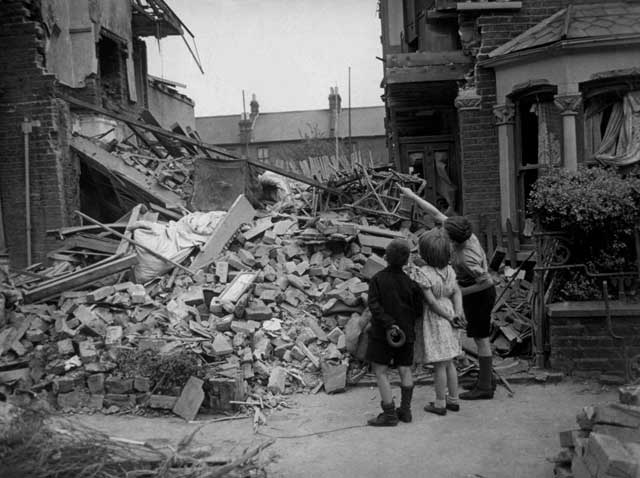The Blitz: the British under attack, By Juliet Gardiner

Good old Winnie!" yelled the loyal and disastrously dressed Cockneys as the Prime Minister strode through the ruins of their East End streets. They would have had another yell coming if they had been able to slip into a timewarp and read an advance copy of this graphic and fluently written survey. As Juliet Gardiner explains, Winston Churchill was desperate for London to be bombed. This would both divert German resources from France and also get the sympathy vote from the Americans, who would then join in the war, preferably on our side.
Annoyingly, Hitler at first made London a no-bomb area, until in late August 1940 a few token bombs fell on the capital. This gave Churchill the chance to retaliate by sending his bombers to Berlin, which provoked Hitler in early September to turn our home front into the front line. Even so, it took Pearl Harbor to spur the Americans into action, by which time the final all-clear had been blown on the Blitz.
The word derives from Blitzkrieg or "lightning war" and describes an aerial bombardment designed to obliterate the target. It can be applied to the murder from the skies inflicted on Barcelona in the Spanish Civil War and then on London and major cities including Bristol, Birmingham, Plymouth and Coventry. The most powerful photograph in the book is of "bombees" trudging past smoking ruins in Clydebank. Dresden too could claim to have been well and truly blitzed by the Allies, not to mention Hiroshima.
London's first night was 7 September, followed by eight solid months. Londoners found themselves living in a horror show. Civilians became "twice citizens", doubling up after a day's work as air raid wardens whose duties included collecting bodies – or bits of bodies. Two left feet and one right foot: how many corpses shall we put that down as?
Keeping the home fires burning was only too easy when it was your home that was burning. It helped if you had a second home in Sussex like Virginia Woolf or a second castle in Windsor like the King and Queen, who retreated there every night. Yet there was a great mixing of classes and indeed intellects; the auxiliary firemen in Westminster included two novelists and poet Stephen Spender. That man sketching people sleeping picturesquely in the Tube was Henry Moore.
Privations ranged from death and destruction, to radio programming which consisted of censored news and Sandy MacPherson at the BBC theatre organ. No wonder listeners re-tuned to Lord Haw Haw on Radio Hamburg. The BBC hit back by scheduling their big guns against his sinister Nazi propaganda: Richard "Stinker" Murdoch and big-hearted comic Arthur Askey.
London's blitz ended with 1,500 killed on the night of 10 May 1941. Londoners' behaviour ranged from that of firefighters risking their lives under shattered masonry to Minnies moaning that the Jews bagged all the best places in the shelters. Folk did on the whole pull together, which inspired a belief that this communal effort should spill over into a more equitable society after the war. But they first had to survive the V1 "flying bombs" and V2 rockets waiting in the wings - surely a great subject for Gardiner's next book.
Subscribe to Independent Premium to bookmark this article
Want to bookmark your favourite articles and stories to read or reference later? Start your Independent Premium subscription today.

Join our commenting forum
Join thought-provoking conversations, follow other Independent readers and see their replies